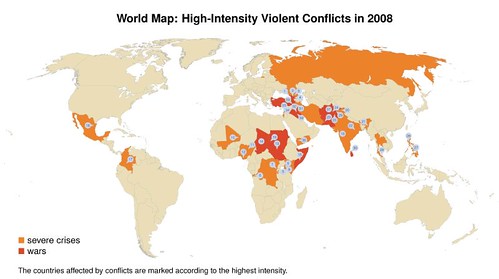I started writing this post in 2008 but didn’t get it finished before the year ended, even with the extra second. In light of the subject, perhaps that is quite apropos.
Like most of you, I’ve been reading all of the end-of-year retrospectives and predictions posts, and scrolling through the “year in photos” or video clips or whatever, caught up in refreshing my memory about just how many things happened in 2008. Wars, elections, economic meltdowns, media shifts, massive natural and man-made disasters, and that’s not even including all my personal stuff. It was a crazy year no matter how you slice it!
And though it is.. overwhelming to absorb this barrage of our collective memories on the net, I do think there’s value to the tradition of reflecting on the year just past and the year ahead. If it’s honest reflection, and you or someone else learns from it, then there can never be too much of it so I refuse to apologize for the length of this post. =)
2008: The Year of Limits
In reflecting on 2008, my experience was one of recognizing “limits”. Some of them are absolute limits, but some of them are just current limitations that I know will change in the future. Some of them are artificial limits, too, and those seem to deserve special attention since it’s easy to make bad choices if you’re working with falsehoods.
The list below describes some of the limits I ran into in 2008…
1. The limits of American-style “free-market” capitalism
 I won’t belabor the point, we’ve all heard plenty of analysis and finger-pointing, but I will repeat the headline from my initial blog post at the beginning of the end of the beginning of the crisis:
I won’t belabor the point, we’ve all heard plenty of analysis and finger-pointing, but I will repeat the headline from my initial blog post at the beginning of the end of the beginning of the crisis:
Privatizing Gains, Socializing Losses
On the days when I feel most pessimistic, I think the TARP bailout is nothing more than a wholesale absconsion of our national treasury with perhaps more on the way. So far at least, the US government seems to be much more concerned about the troubles of our corporate citizens than the troubles of our human citizens. On my optimistic days.. I have the teensiest bit of hope that _someone_ _somewhere_ will have the will and the power to do what’s best for the people, not just what’s best for the corporations.
The economic problems have limited the options for many people I know – friends and relatives laid off, retirement nest eggs shrunk to nothing, people unable to sell or buy houses and get on with life. On a personal level, I haven’t felt this economically pinched in a long time. My modest university salary isn’t keeping up with the rate of change very well and in 2008 I began to really hit the limit of my budget in ways that cause me to question what I’m doing, how I’m doing it, and how much I can scale back.
Of course, many people are in tight situations right now, that’s why they call it a recession! But it’s what choices you make when you start to hit those limits that define who you are as a person and as a people. The government (of the people, by the people, for the people) has choices, too. I guess we’ll see in 2009 what choices we all make in light of these new limits and I hope for all of our sakes that they turn out to be good choices.
2. The limits of American racism

Of all the limits on my list, this one felt really good to bump up against. I can’t say how immensely proud I am of my country for the results of the 2008 presidential election. I am relieved to know that the president-elect’s middle name is Hussein and his last name sounds like Osama, and he’s black, and spent some time living in a Muslim country, and grew up in a non “2 parent/2.1 kids” houseshold, and that none of these things kept him from being elected. Not that racism has ended by any means, but this was an example of its limits and it really does give me hope.
On the personal side, my 74 year old grandpa who still refers to people as “colored” from time to time, and who has been a staunch Republican voter all of his life, actually voted for a black Democrat. Yes Virginia, hell really did freeze over! I can’t take 100% credit for this change of course, but we had a lot of downright difficult and uncomfortable conversations about race, so this year’s election felt like a personal victory as much as a national milestone.
3. The limits of the American educational system and limits to learning online
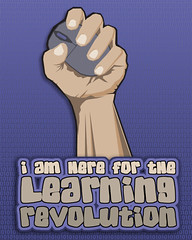 It’s possible I am living in a concrete-reinforced, super-duper-thick, no-sound-enters-or-escapes echo chamber, but it seems that everywhere I turn, everyone from _everyone_ is convinced that the American educational system is in desperate need of a massive, major overhaul. In my own neck of the woods, Ohio is in the process of implementing a state-wide university system, several education related organizations that are funded by the state are being abolished or merged, and a couple of universities including my own are switching from quarter systems to semesters (not as simple as it may sound and more expensive than you might think).
It’s possible I am living in a concrete-reinforced, super-duper-thick, no-sound-enters-or-escapes echo chamber, but it seems that everywhere I turn, everyone from _everyone_ is convinced that the American educational system is in desperate need of a massive, major overhaul. In my own neck of the woods, Ohio is in the process of implementing a state-wide university system, several education related organizations that are funded by the state are being abolished or merged, and a couple of universities including my own are switching from quarter systems to semesters (not as simple as it may sound and more expensive than you might think).
So change is happening already in a pretty big way, but I’m not sure how much these changes will address some of the underlying problems. One of which, I am convinced, is a staggering lack of understanding about the power of current IT/web/net based technologies. There is increasing curiosity at all levels – thank goodness or I wouldn’t have a job! But from administrators to faculty to staff, I’m perpetually shocked by how little others use the web even for basic things,like as a reference system. Everyone now uses email, of course, and LMS adoption has increased tremendously in both breadth and depth of use, and the core university business and billing systems are state of the art, but the social media/personal empowerment side of the web doesn’t seem to have penetrated academia very much yet at all. You might be surprised how many faculty don’t know about using quotes in google searching, for example, or who don’t read the blogs of their peers from other institutions.
I find that pretty distressing for a lot of different reasons, not least of which because this lack of understanding really limits my choices as a student (or potential customer, if you prefer).
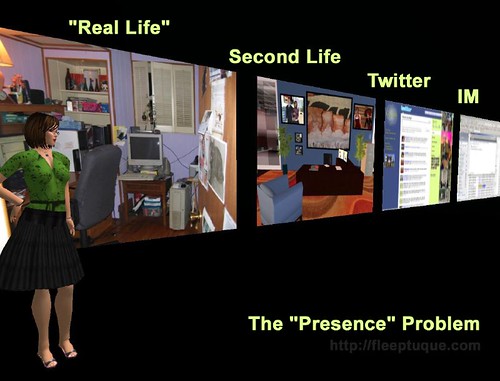 The first problem is that the thing I want to study not only doesn’t have its own discipline or recognized curriculum, most people aren’t even aware it exists! My area of study is the metaverse and I spend far more time trying to demonstrate that it is “real” (ie has real impact) and justifying why we should be studying it than anything else. What time I do get to spend on actual research doesn’t count towards tenure, and unfortunately, most of my output is in blog posts and wikis and PDFs and Second Life builds, and none of these things will get me a degree either. They aren’t “accredited” kinds of output.
The first problem is that the thing I want to study not only doesn’t have its own discipline or recognized curriculum, most people aren’t even aware it exists! My area of study is the metaverse and I spend far more time trying to demonstrate that it is “real” (ie has real impact) and justifying why we should be studying it than anything else. What time I do get to spend on actual research doesn’t count towards tenure, and unfortunately, most of my output is in blog posts and wikis and PDFs and Second Life builds, and none of these things will get me a degree either. They aren’t “accredited” kinds of output.
The second problem is that even if I could find a good fit in a program, then what? Will I be able to bear sitting in a classroom with a bad teacher who regurgitates the text book and wants me to regurgitate it too? Will I be able to keep my trap shut when we all hand in our papers to the prof and learn nothing from each other instead of sharing them so we all learn more?
 When I think of it, I tend to tell myself and others that I can’t find the time or money to go back to grad school right now (artifical limit, I’m sure I COULD if I were willing to radically alter my life), but the truth is something different: I can’t bear the thought of fitting my learning style back into that crummy old model when I’ve found something 1000000 times better – the entire web is my school, my laboratory, and my teacher. I would guess that in 2008 I read more reports, white papers, and peer-reviewed journal articles (and thousands of blog posts and news articles), attended more lectures by more world-class thinkers and teachers (and talked to them, individually!), and had more hands-on, active and engaging learning experiences than I have ever had in any other year of my entire life – in school or out. I also spent a heck of a lot of time reflecting on what I learned, sharing it with others, collaborating on shared learning experiences, and had a few pretty nice milestone publications of my own.
When I think of it, I tend to tell myself and others that I can’t find the time or money to go back to grad school right now (artifical limit, I’m sure I COULD if I were willing to radically alter my life), but the truth is something different: I can’t bear the thought of fitting my learning style back into that crummy old model when I’ve found something 1000000 times better – the entire web is my school, my laboratory, and my teacher. I would guess that in 2008 I read more reports, white papers, and peer-reviewed journal articles (and thousands of blog posts and news articles), attended more lectures by more world-class thinkers and teachers (and talked to them, individually!), and had more hands-on, active and engaging learning experiences than I have ever had in any other year of my entire life – in school or out. I also spent a heck of a lot of time reflecting on what I learned, sharing it with others, collaborating on shared learning experiences, and had a few pretty nice milestone publications of my own.
Everywhere I look, I’m butting up against limits. Limits of the existing system, limits to people’s understanding about what it is I want to study, limits in program and curriculum choices, personal limitations (financial, practical, selfishly wanting to learn MY way instead of THEIR way)..
Furthermore, despite the free and wonderful education I received from the intarnets this year, I also learned that there are limits here too. There are limits to how much information I can process, how many connections I can form, and how many channels of communication I can keep up with. There are absolutely, most definitely limits to how many emails I can process in a day. There are limits to how much I can learn on my own unaided by others. I often have questions, need help, need guidance, need mentoring, need direction. I know without a doubt my work and output would improve if I had a better foundational understanding of both the technology that makes the metaverse possible and the research that already exists about human behavior in online environments. I don’t for a second believe I can “master” this material all on my own, even with the tremendous resources the web offers.
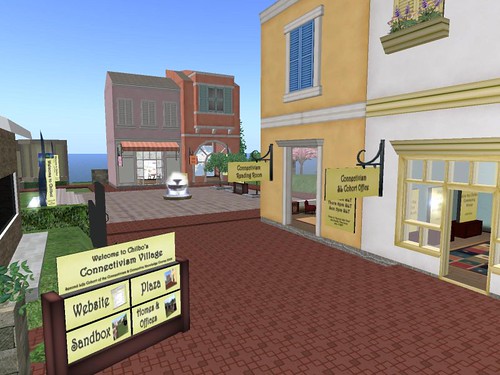 And of all my learning experiences online this year, I’m perhaps most grateful for my experience with the Connectivism & Connective Knowledge MOOC (Massively Open Online Course), because it _broke_ some (artificial) limits in my understanding about what a “class” is and could be, reinforced some limits I was aware of (how much info/connections/channels I could keep up with), and gave an example of how universities might overcome limits in how many students they reach.
And of all my learning experiences online this year, I’m perhaps most grateful for my experience with the Connectivism & Connective Knowledge MOOC (Massively Open Online Course), because it _broke_ some (artificial) limits in my understanding about what a “class” is and could be, reinforced some limits I was aware of (how much info/connections/channels I could keep up with), and gave an example of how universities might overcome limits in how many students they reach.
Without a doubt, these limits are frustrating, but not altogether discouraging. It just means there’s much work to be done, and I sincerely hope decision makers at the institutional level are paying attention to technology, but at the same time, I also hope that those of us using and evangelizing technology are being honest about its limits even as we explore its promises.
And speaking of technology evangelism…
4. The limits of personal evangelism
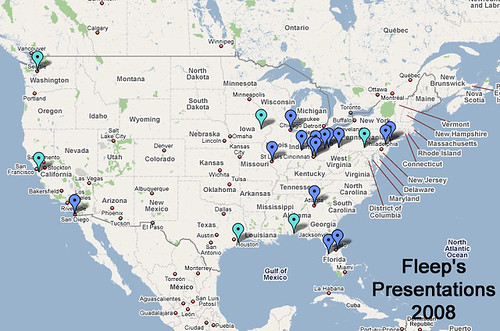 My suitcases are tattered from so many cross-country flights here there and everywhere talking about Second Life, Web 2.0, and the emerging metaverse. I gave talks at conferences and workshops and lunches, to teachers, professors, administrators, instructional designers, businesses, entrepreneurs, laywers, government employees.. so many different sectors of society. What I’ve taken from all my days on the road is that there’s a real lack of perceived value and ROI. 1) People need to see more evidence that this technology is useful for accomplishing their goals before they will be willing to invest the time and resources it takes to get to successful implementation. 2) The technology itself must become cheaper and easier to use.
My suitcases are tattered from so many cross-country flights here there and everywhere talking about Second Life, Web 2.0, and the emerging metaverse. I gave talks at conferences and workshops and lunches, to teachers, professors, administrators, instructional designers, businesses, entrepreneurs, laywers, government employees.. so many different sectors of society. What I’ve taken from all my days on the road is that there’s a real lack of perceived value and ROI. 1) People need to see more evidence that this technology is useful for accomplishing their goals before they will be willing to invest the time and resources it takes to get to successful implementation. 2) The technology itself must become cheaper and easier to use.
This is not revolutionary news, I know. But I’m reminding myself because as I mentioned above, I genuinely hope to do more research into those areas so that the next time I spend all day flying across the country just to give a two hour talk, I feel like it was really and truly worth the trip for me and the audience and the university that paid for me to do it.
I guess this means my “zealot phase” (and hopefully “self-righteous jerk phase”) is over for the moment. That isn’t to say that I’ve given up, but rather that I’ve learned the limits of what I, Fleep can do alone. I need to start leveraging my networks better and work in collaboration with more people instead of running myself ragged trying to do too much alone.
5. Limits of the Second Life platform and our current Metaverse
Of course, the job of evangelizing would be a lot easier if the thing itself were easier. Alas, we face some tough issues. The metaverse as a concept is mind-boggling for many, the best iteration of it at the moment (Second Life) is hard to use and has serious limitations, and everything else out on the horizon is still in alpha/beta phase.
I really can’t stress enough what an obstacle our current lack of.. vocabulary is. What is a virtual world? What is the metaverse? What the heck is Castranova talking about with all this synthetic stuff?
Earlier this year when I was struggling with the Looking to the Future: Higher Education in the Metaverse piece, the hardest part was explaining what the metaverse currently IS, nevermind what it might be in the future. Here’s what I wrote:
In its current context, the metaverse is a complex concept. For the purposes of this article, the definition in the Metaverse Roadmap will suffice: “In recent years, the term has grown beyond Stephenson’s 1992 vision of an immersive 3D virtual world, to include aspects of the physical world objects, actors, interfaces, and networks that construct and interact with virtual environments. . . . The Metaverse is the convergence of 1) virtually-enhanced physical reality and 2) physically persistent virtual space. It is a fusion of both, while allowing users to experience it as either.â€
In short, we can imagine multiple and myriad digital mirrors of the real world existing alongside multiple and myriad digital worlds that do not represent the real world, all used for a variety of purposes, tied into a variety of communication methods, and populated by any user with Internet access, as well as a steady stream of data originating from objects and devices in the real world.
That’s awful! A mouthful of confusing stuff and I feel very disappointed in myself that I couldn’t find a better way to communicate it. That’s a limitation I (we) must break through in the coming years.
Beyond the limits of our terminology, there are serious limits with existing platform(s) that can’t be ignored either. I still believe that anyone interested in the metaverse must be in or at least paying attention to Second Life – Linden Lab’s platform and the OpenSim derivatives are the most promising metaverse project on the horizon, and perhaps more importantly, the people using, working, and playing in Second Life simply _are_ the vanguard.
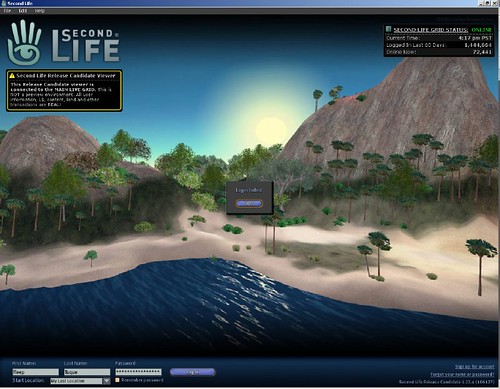 But Linden Lab’s Second Life, and the alpha-stage OpenSim grids, are still extremely limited in their enterprise use. Whether the intention is to use it as a social or collaboration space, or as a modeling and prototyping space, or to explore the new frontiers of music and art made possible in these worlds – the platforms need a LOT of work across the board, from the GUI to reliability to providing access to other digital content. Sadly, after 5 years of being out of beta, Second Life’s group IMs still don’t work reliably. I can’t show a flash or .wmv movie in Second Life, can’t collaboratively access webpages and documents with others easily, and it takes forever and 50 steps to do something as simple as making a prim clickable to launch a webpage.
But Linden Lab’s Second Life, and the alpha-stage OpenSim grids, are still extremely limited in their enterprise use. Whether the intention is to use it as a social or collaboration space, or as a modeling and prototyping space, or to explore the new frontiers of music and art made possible in these worlds – the platforms need a LOT of work across the board, from the GUI to reliability to providing access to other digital content. Sadly, after 5 years of being out of beta, Second Life’s group IMs still don’t work reliably. I can’t show a flash or .wmv movie in Second Life, can’t collaboratively access webpages and documents with others easily, and it takes forever and 50 steps to do something as simple as making a prim clickable to launch a webpage.
And those are the simplest technical limitations that need to be overcome. That’s not even getting into the wet, squishy world of legal, philosophical, and social questions: content creator rights, intellectual properly, who has jurisdiction, who governs these spaces, code as law, what’s happening with all of the data we generate from “living” in these spaces and how can we protect ourselves from its misuse, what are the social implications for communities moving to the metaverse, and on and on and on..
In other words, we have a LOT of work to do.
6. The limits of Will Wright
 Yes, I’m sorry, this one gets a whole bullet point of its own. Do you have ANY IDEA how long I waited, and with how much _anticipation_ I waited for the release of Spore? (Many many years, and a lot, respectively.)
Yes, I’m sorry, this one gets a whole bullet point of its own. Do you have ANY IDEA how long I waited, and with how much _anticipation_ I waited for the release of Spore? (Many many years, and a lot, respectively.)
Others have done a much better job than I in analyzing just why it was such a rotten egg, but I think that might be my biggest (most trivial) disappointment of the year.  I don’t know where it all went so wrong, Will, but dude, you really let us down.
(Sorry, needed a little levity before tackling #7..)
7. The limits of life itself
In late 2007, we learned that my Dad (grandpa, actually, but my dad in all other ways) had stage-4 metastatic lung cancer that had already spread to his adrenal glands. By mid-2008, it had spread to his spine. Helping to take care of him through this battle with cancer has been excruciating and it affected every single day of the year for me.
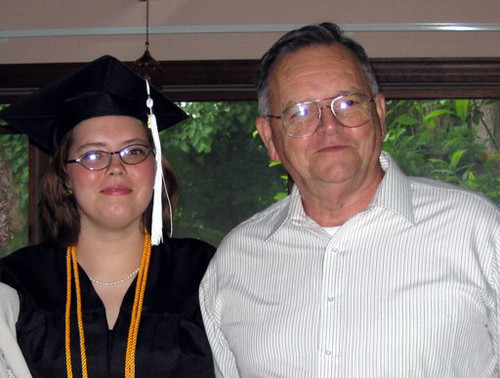
I know that death is a part of life. I know that death is inevitable. I know that I am neither the first nor the last person to lose a parent or to lose a loved one to cancer. I know that some day I will die. I know all of these things, but I’ve never _felt_ them until now. In my heart, I know it’s a minor miracle that he’s survived more than a year past the initial diagnosis, and it’s a gift that we’ve had all this time to say goodbye, share memories, and adjust to the hard reality. But it has also irrevocably changed my sense of time. I see the limits it imposes on us all in the starkest of terms now.
This experience has also made me wonder how on earth people without families or support networks manage in the face of serious illness (something we’re all bound to face) because without a doubt, I have finally seen the limits of the American health-care system up close and personal.
Wow, what a wreck. I don’t even know where to begin. The absurdities of insurance claims and Medicare, Part-D and doughnut holes, hospital staff that don’t even put on clean gloves unless you ask them too, different doctors with different charts and lab results and patient information systems that don’t talk to each other, medication regimens that require a PhD and 50 gazillion bottles, refills, and dosages to keep up with, doctors prescribing medications that conflict with pre-existing orders… the list goes on and on and on and on. It’s insane. INSANE.
Our family care-team is made up of four intelligent, literate, capable people and we can’t really keep track of it all. The hoops are simply ridiculous, the cracks in the system are more like black holes, and for all the mistakes or near-mistakes we’ve caught, I fear to think of all the ones we didn’t. And I would be remiss if I didn’t mention my deep bitterness that the _only_ part of the American health-care system that appears to be using IT efficiently is the damned billing systems. Sharing information about the patient to improve care? That’s a spaghetti mess, but they can sure share information about how much it all costs!
…
Perhaps my viewing the year 2008 from this prism of limitations is all the result of Dad’s cancer; maybe it’s colored my view so much that limits are all I see at the moment. But I don’t really think so. When I look at what’s happening in a broader context, I see that the American economic, education, and health care systems aren’t the only large-scale systems and institutions that appear to be feeling the strain.
For one, the financial/economic crisis is definitely a global one. It’s not an indivual experience, or a national experience, it’s a global one. Even those who haven’t felt the pinch yet have certainly felt the fear.
For another, I believe wars and violence result when political systems fail. Mumbai. Iraq, Afghanistan, Pakistan, Sudan, Palestine, Georgia, and many more places besides, deaths caused by people killing other people, caused by the limits of our existing political institutions.
Human activity in combination with completely “natural” weather and geological phenomena are rapidly, and I mean RAPIDLY changing our environment. The very finite resources of the planet and the real consequences of natural disasters are absolute limits that we simply can’t afford to ignore. The earthquake in Sichuan, China killed almost 70,000 people. The Nargis cyclone in Myanmar killed almost 135,000 people. Predictions seem to indicate that more trouble is on the way, and for the most part, our individual, national, and global responses to these challenges have seem limited by disorganization, misinformation, and a terrible refusal to plan for the reality we all know is coming. It’s absurd. And frightening.
I should probably stop there, this post already turned into something of a monster and I could go on in this vein for quite a while. But the lingering question I have at the end of all this reflection is this:
Have we reached the limits of our patience with behaviors and systems that just plain don’t work anymore?
I sure hope so, because the upside, the real benefit to recognizing these limits, is the ability to leap into the paradigm-shift – and leap we must.
The parameters aren’t what you thought they were.
The rules of the game are changing.
The world of the 21st century is different than the world of the 20th.
The sooner we come to terms with it, the sooner we can start dealing with it. These limits – even the artificial ones – really need to, can, and must be addressed.
I don’t know if I’m up for all the challenges I see looming in the days ahead, with my work, my personal circumstances, with Dad’s cancer. I don’t know how to best prepare, either, but if I’m sure of anything after 2008, it’s that I don’t have a choice about it anymore. The changes are already coming too thick and too fast to ignore, best get with it, buckle down, and get ready.
(And 10 days after the new year, I finally get this posted. Hooray.)

